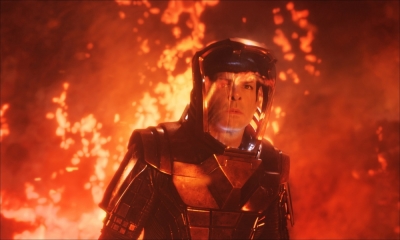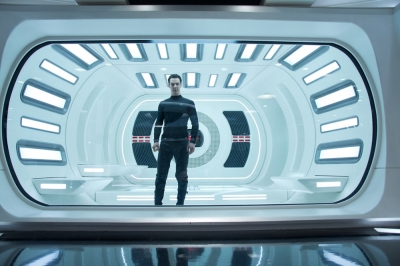'Star Trek Into Darkness': A Tale of Two Sacrifices
[Warning: Spoiler Alert]
"Star Trek Into Darkness," the stunning blockbuster hit sequel to Director J.J. Abrams' "Star Trek," centers on the theme of sacrifice. With stunning graphics, beautiful music, and witty dialogue, it showcases the value and dignity of human life.
As the lights dim, a magnificent pyramid seizes the audience's attention. Captain James T. Kirk (Chris Pine) runs – at breakneck speed – through a lush extraterrestrial forest, fleeing savages who have never seen a human face, much less a starship.

Commander Spock (Zachary Quinto) falls down to the surface of a volcano to rescue the planet from impending destruction. "The needs of the many outweigh the needs of the few," he says, spreading his arms out as the lava swallows him.
Spock insists Kirk leave him to die, because saving him would violate "the prime directive" – letting the native culture develop without interference. Instead, Kirk throws caution to the wind.
Ironically, this sacrifice proves mean-spirited. Spock reports Kirk's heroism to the authorities, resulting in a demotion. Quickly resolved, this demotion shows a weakness in the film – its rushed and over-complicated plot. Later, Spock's girlfriend Uhura (Zoe Saldana) also voices her anger. "At that volcano, you didn't give a thought to us," she says, "what it would do to me if you died, Spock. You didn't care."
"You mistake my choice not to feel as a reflection of not caring," he explains, "while I assure you the truth is precisely the opposite." Nevertheless, he chose to die rather than compromise the mission.
Captain Kirk meets Spock's false heroism with a noble sacrifice of his own. Only this time, it's completely necessary.

As the Enterprise falls out of the sky, broken from a hundred hits, Kirk rushes to repair the engine's core. The ship's engineer, Scotty (Simon Pegg), explains, "there's no way we can redirect the power. The ship is dead, sir."
Undaunted, intrepid, reckless, Kirk responds, "no, she's not." "If we go in there, we'll die. The radiation will kill us," Scotty warns. Silent, the captain pushes himself through the door and shuts it immediately behind him. Only one will die to save the Enterprise's thousands.
Holes open all over the ship, sending crew members into the deep, dark, cold of empty space. Passing through earth's atmosphere, the megaton tin can heats up, about to explode. As Kirk climbs to the reactor's core, his strength, like the strength of his ship, wanes. Step by step, the radiation takes its toll.
When at last he fixes the core, energy is restored, and thousands of lives saved, Kirk falls down, exhausted. The ship rises above the clouds, with the Star Trek theme hailing its triumph. "It's a miracle," a crewmember says. "There are no such things," Spock corrects.
The commander rushes to the engine room, to see the miracle's explanation. "How's the ship?" Kirk asks, through a locked door. "Out of danger – You saved the crew," Spock notes, astonished.
"I'm scared, Spock. Help me not be – How do you choose not to feel?" Spock chokes on his tears – "Right now, I'm failing."
"I want you to know why I couldn't let you die. Because you are my friend," says the commander. As their hands touch through the glass, Kirk copies Spock's iconic sign, a last gesture of love and respect.
In classic sci-fi fashion, the crew discovers a way to bring Kirk back. But that need not tarnish his sacrifice.
This correction – the captain taking the sacrifice Spock willingly offered – reminds Christians both of God's refusal to have King David build his temple and of Jesus' substitution on the Cross. David offered to build God a house, but God built one for him instead. Men try to justify themselves, but only Christ saves them from their sin.
Kirk is not God, but this moment echoes the Gospel, not to mention the end of Charles Dickens' A Tale of Two Cities.
As Sydney Carton lays down his life, he articulates the classic Western theme of sacrifice. "It is a far, far better thing that I do, than I have ever done; it is a far, far better rest that I go to than I have ever known."




























